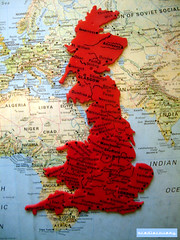The two meanings of ‘British’
Nationalists and Unionists have been having a curious little spat for the last couple of days. I think it started with Ed Miliband claiming that Scots will no longer be British if their country votes to leave the United Kingdom. Nationalists were quick to reply that given that Scotland is geographically a part of Great Britain, Scots will always be British, no matter which state they’re living in.
I do believe it’s a bit of a silly fight to get into.
It’s a matter of fact that the word British has at least two meanings in modern English:
- relating to, denoting, or characteristic of Great Britain [where Great Britain can then mean either just the island or include also the small adjacent islands such as Skye and the Isle of Wight] — parallel to the modern use of Scandinavian
- relating to, denoting, or characteristic of the United Kingdom — parallel to the occasional use of Scandinavian to refer to people from the short-lived Kingdom of Sweden and Norway
The second meaning is probably more frequent than the first for the simple reason that there isn’t any other convenient adjective describing somebody from the United Kingdom of Great Britain and Northern Ireland, and it’s obviously this meaning that Ed Miliband was referring to. However, the first meaning seems more primary, and of course you can’t tell people in Scotland that they suddenly aren’t allowed to use this sense of the word.
I guess it’s related to the question of what the rUK will be called after Scottish Independence:
- The United Kingdom of Great Britain and Northern Ireland? It’s really not a good name when one half of Great Britain has just left.
- The United Kingdom of England and Northern Ireland? Although Wales was part of England prior to the formation of the Kingdom of Great Britain, I doubt they’d accept this.
- The United Kingdom of England, Wales and Northern Ireland? I’d say this is the most likely result.
However, which adjective will people use to refer to somebody or something from The United Kingdom of England, Wales and Northern Ireland? Although it will annoy the Northern Irish and the Scots in equal measure, I have a feeling many English people will continue to use British. I mean, what’s the alternative? Engwalnish?

Pingback: The Kingdom of England, Wales and Northern Ireland | Arc of Prosperity
Is it not more than that in a way that makes the comparison with Scandinavia even more apposite? “Britain” is not synonymous with “Great Britain”. “Britain” is an archipelago whilst Scandinavia is (largely but not solely) a peninsula. Both then are geographical descriptors. “Great” Britain is the largest of the British Isles which include Ireland, the Isle of Man and others. So, on independence, Scotland will be “British” like Finland is Scandinavian and Estonia is Baltic. The Brits can then all vote for each other in the Eurovision Song Contest.